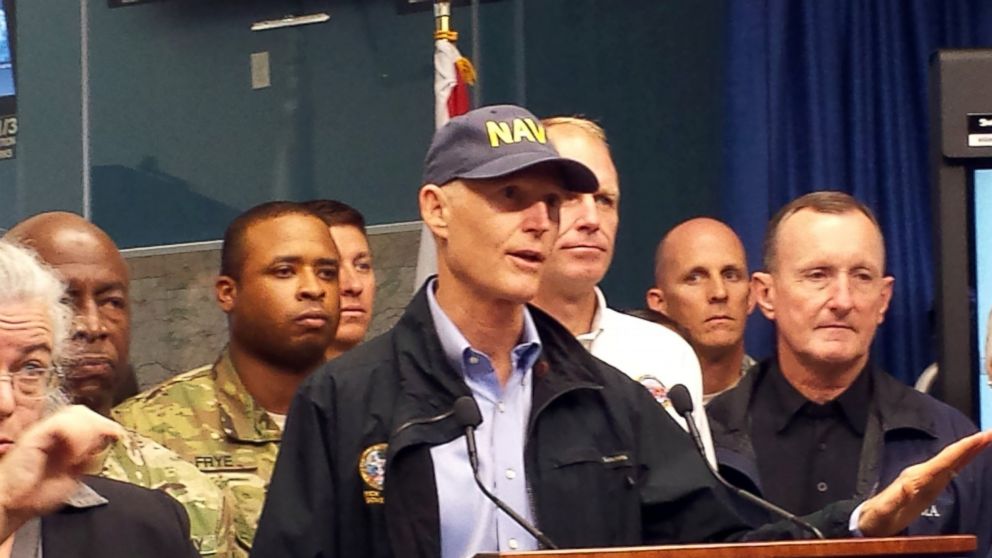Hurricane Matthew Could Cost Dems More Votes in Battleground Florida
The Florida governor refuses to push back the state's Oct. 11 deadline.
— -- Late-registering Democrats could bear the brunt of Florida’s refusal to extend Tuesday’s voter registration deadline in the wake of Hurricane Matthew’s toll on many of the state’s battered residents, political experts suggest.
"You would suspect it would predominantly affect the Clinton campaign because when you look at the people who need to be registered, they're predominantly younger people and they fit more the profile of the Democratic coalition," Michael McDonald, an associate professor of political science at the University of Florida, told ABC News today.
The storm's path actually appears to skew Republican, McDonald added, but more of those voters are likely already registered and wouldn't be cut off by the lack of a deadline extension.
"The hurricane is going up a part of Florida that is wealthier and more Republican," he said, specifically citing Jacksonville and the city's sizable population of retired military personnel.
"If there are votes that could potentially be affected by this hurricane, they're more likely to be Democratic votes than Republican votes."
Gov. Rick Scott emphasized today that Florida won’t move back its Oct. 11 registration deadline in spite of the hurricane that is wreaking havoc along the state's eastern coast.
Based on data from the 2012 presidential election, the number of voters who may have put off registration until the last few days before the deadline could be in the thousands.
Daniel Smith, a University of Florida professor who focuses on election trends, shared voter registration figures from the 2012 presidential election on Twitter. The charts show day-by-day breakdowns of how many people registered leading up to that year's Oct. 8 deadline.
In the final five days before the 2012 deadline, 19,249 Democrats registered to vote while 11,129 Republicans did the same, according to the state data he shared.
But Gov. Scott says the state will not push back its voter registration deadline, which is four days away on Oct. 11.
"We’ve had plenty of time to register," the Republican governor, who is actively supporting GOP presidential nominee Donald Trump, told ABC News’ "Good Morning America" today.
"Look, this is politics. We just, right now I'm focused on getting this done. I’m focused on saving everybody’s life. The biggest issue for me is I want everyone to survive this.”

Georgia and Florida already had the same deadline for registration forms sent by mail, and South Carolina joined them after pushing its deadline back to Oct. 11 from Oct. 9.
But because of Florida's potential significance in this presidential election as a battleground state, its decision not to push back the deadlines could affect the number of people who are able to vote from now, for early voting, until Election Day on Nov. 8.
The Clinton campaign called for an extension of the deadline Thursday.
"Our hope would be that a little bit more time will be given for people who were expecting to be able to get registered before the election, and we certainly expect that the governor and local officials will make that possible," Clinton campaign manager Robby Mook said.
But Mook added that the campaign was focused on the safety of Floridians.
"Our first priority on Hurricane Matthew is that people are safe," he said. "We have been doing everything we can on social media and email list to make sure that all Floridians heed the warnings of public officials that are saying this could be a very deadly storm."
Trump campaign officials issued a prepared statement Thursday sending "thoughts and prayers" to those in the storm's path and thanking local law enforcement and first responders. The statement makes no mention of voter registration deadlines, and the topic did not come up at a town-hall style meeting he attended in New Hampshire Thursday night.
The next presidential debate is slated for Sunday night, and because it will be in St. Louis, far west of the storm’s path, schedule changes are unlikely, a senior official from the Commission on Presidential Debates told ABC News.
ABC News' Tom Llamas contributed to this report.




